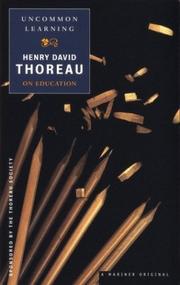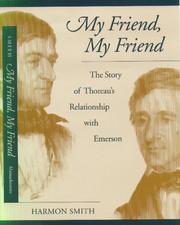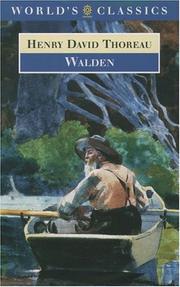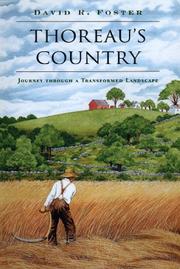| Listing 1 - 4 of 4 |
Sort by
|

ISBN: 0395947979 Year: 1999 Publisher: Boston : Houghton Mifflin,
Abstract | Keywords | Export | Availability | Bookmark
 Loading...
Loading...Choose an application
- Reference Manager
- EndNote
- RefWorks (Direct export to RefWorks)
Education --- Quotations, maxims, etc. --- Thoreau, Henry David, --- Quotations.

ISBN: 1558491864 0585314411 9780585314419 9781558491861 1122055951 9781122055956 Year: 1999 Publisher: Amherst University of Massachusetts Press
Abstract | Keywords | Export | Availability | Bookmark
 Loading...
Loading...Choose an application
- Reference Manager
- EndNote
- RefWorks (Direct export to RefWorks)
Thoreau, Henry David --- Friends and associates --- Emerson, Ralph Waldo --- Authors [American ] --- 19th century --- Biography --- Friendship --- United States --- History

ISBN: 019192119X 0191593427 9780191593420 0192839217 9780192839213 Year: 1999 Publisher: Oxford Oxford University Press
Abstract | Keywords | Export | Availability | Bookmark
 Loading...
Loading...Choose an application
- Reference Manager
- EndNote
- RefWorks (Direct export to RefWorks)
In 1845 Thoreau, disdainful of America's commercialism and industrialism, left his home town in Massachusetts to begin a new life alone, in a hut on the north-west shore of Walden Pond. This is his account of this experiment in solitary living.
Wilderness areas --- Natural history --- Authors, American --- Thoreau, Henry David, --- Homes and haunts --- Walden Woods (Mass.) --- Social life and customs.

ISBN: 0674037154 9780674037151 0674886453 9780674886452 0674006682 Year: 1999 Publisher: Cambridge, Mass. Harvard University Press
Abstract | Keywords | Export | Availability | Bookmark
 Loading...
Loading...Choose an application
- Reference Manager
- EndNote
- RefWorks (Direct export to RefWorks)
In 1977 David Foster took to the woods of New England to build a cabin with his own hands. Along with a few tools he brought a copy of the journals of Henry David Thoreau. Foster was struck by how different the forested landscape around him was from the one Thoreau described more than a century earlier. The sights and sounds that Thoreau experienced on his daily walks through nineteenth-century Concord were those of rolling farmland, small woodlands, and farmers endlessly working the land. As Foster explored the New England landscape, he discovered ancient ruins of cellar holes, stone walls, and abandoned cartways--all remnants of this earlier land now largely covered by forest. How had Thoreau's open countryside, shaped by ax and plough, divided by fences and laneways, become a forested landscape? Part ecological and historical puzzle, this book brings a vanished countryside to life in all its dimensions, human and natural, offering a rich record of human imprint upon the land. Extensive excerpts from the journals show us, through the vividly recorded details of daily life, a Thoreau intimately acquainted with the ways in which he and his neighbors were changing and remaking the New England landscape. Foster adds the perspective of a modern forest ecologist and landscape historian, using the journals to trace themes of historical and social change. Thoreau's journals evoke not a wilderness retreat but the emotions and natural history that come from an old and humanized landscape. It is with a new understanding of the human role in shaping that landscape, Foster argues, that we can best prepare ourselves to appreciate and conserve it today. From the journal: "I have collected and split up now quite a pile of driftwood--rails and riders and stems and stumps of trees--perhaps half or three quarters of a tree.Each stick I deal with has a history, and I read it as I am handling it, and, last of all, I remember my adventures in getting it, while it is burning in the winter evening. That is the most interesting part of its history. It has made part of a fence or a bridge, perchance, or has been rooted out of a clearing and bears the marks of fire on it.Thus one half of the value of my wood is enjoyed before it is housed, and the other half is equal to the whole value of an equal quantity of the wood which I buy." --October 20, 1855
Authors, American --- Landscape changes --- Natural history --- Change, Landscape --- Geomorphology --- Thoreau, Henry David, --- Foster, David R., --- Thoreau, Henry David --- Thoreau, Henry D. --- Toro, Genri Devid, --- Thoreau, Henry, --- Toro, Henri Dejvid, --- Thorō, Enry Deēvint, --- So-lo, --- Toro, Henri Daṿid, --- Thoreau, David Henry, --- Sorō, Henrī Deividdo, --- טהארא, הענרי דייוויד --- טהארא, הענרי דײװיד --- תורו, הנרי דוד --- תורו, הנרי דוד, --- 梭罗, --- ソロー ヘンリー・デイヴィッド, --- Homes and haunts --- Travel --- New England --- Intellectual life --- Description and travel. --- Description and travel
| Listing 1 - 4 of 4 |
Sort by
|

 Search
Search Feedback
Feedback About
About Help
Help News
News